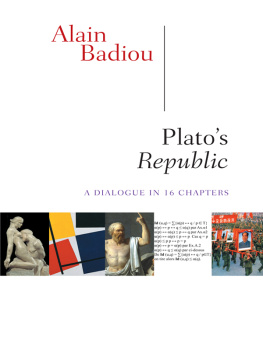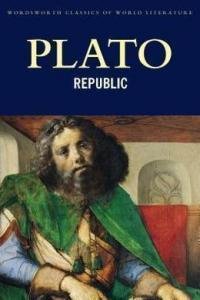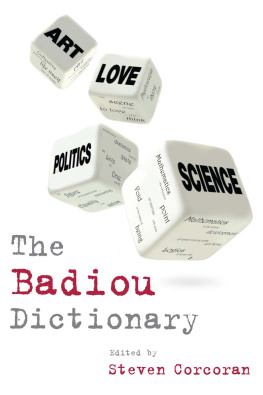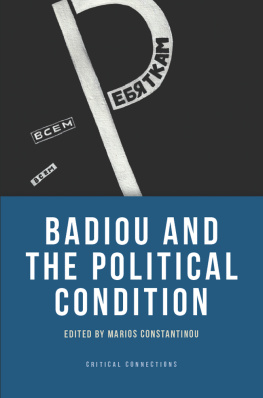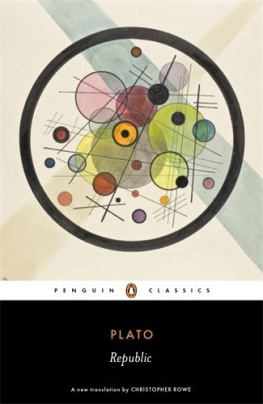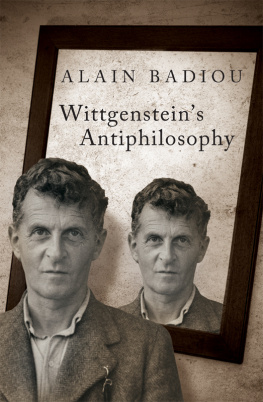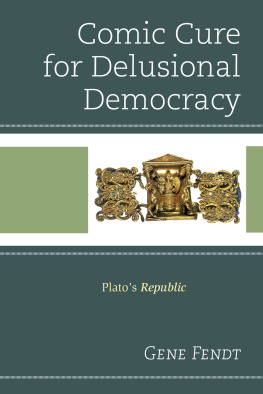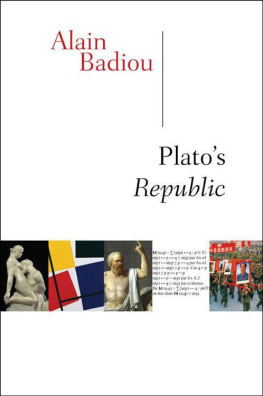PLATOS REPUBLIC
publication of this dialogue is enabled by a grant from Figure Foundation
PLATOS REPUBLIC
A Dialogue in 16 Chapters
ALAIN BADIOU
Translated by Susan Spitzer and Introduction by Kenneth Reinhard
Columbia University Press
New York
Columbia University Press
Publishers Since 1893
New York Chichester, West Sussex
cup.columbia.edu
First published in French as La Rpublique de Platon Librairie Arthme Fayard, 2012
Translation copyright Polity Press 2012
Paperback edition, 2015
All rights reserved
E-ISBN 978-0-231-50065-4
Library of Congress Cataloging-in-Publication Data Badiou, Alain.
[Rpublique de Platon. English]
Platos Republic : a dialogue in 16 chapters / Alain Badiou ; translated by Susan Spitzer ; introduction by Kenneth Reinhard.
p. cm.
Includes bibiographical references and index.
ISBN 978-0-231-16016-2 (cloth: alk. paper) ISBN 978-0-231-16017-9 (pbk. : alk. paper) ISBN 978-0-231-50065-4 (ebook)
1. Plato. Republic. I. Title.
JC71.P6B2813 2012
321.07dc23
2012014207
Printed and bound in Great Britain by MPG Books Group Limited, Bodmin, Cornwall
A Columbia University Press E-book.
CUP would be pleased to hear about your reading experience with this e-book at .
References to websites (URLs) were accurate at the time of writing. Neither the author nor Columbia University Press is responsible for URLs that may have expired or changed since the manuscript was prepared.
CONTENTS
The numbers and letters in parentheses after each chapter title (e.g. 327a) refer to a division of the text into sections, each usually about ten lines long. Although this division owes its existence solely to ancient methods of editing and paginating manuscripts, it has become the traditional one, enabling readers to find their place not only in the Greek text but also in the available translations, which include such indications in the text something I have not done.
Badious Sublime Translation of the Republic
Kenneth Reinhard
Alain Badiou stands, virtually alone among major philosophers at the beginning of the twenty-first century, as a self-proclaimed Platonist, the champion of what he calls a Platonism of the multiple.
There is no place for truth in sophistic debates, where it will inevitably be suspected of authoritarianism. Truth cannot be produced through the exchange of opinions, and in the Republic the arch-sophist Thrasymachus is not convinced by Socrates arguments but merely reduced to silence. Truth is already there, embodied in the subjective position represented by Socrates, and Platos dialogues, above all the Republic, will explore and articulate its consequences.
An unorthodox reading of Plato has been central to Badious thinking, at least since his early book, The Concept of Model, which originated as a lecture in Althussers seminar, just days before the great events in Paris of May 1968. Badious 1988 work, Being and Event, opens with a strongly unconventional reading of Platos Parmenides as a theory of inconsistent multiplicity, irreducible to the ontology of the One and the Many, an argument he expands in The Question of Being Today, published in the 1998 Briefings on Existence. Badious 198990 seminar on Platos Republic examines the relationship between the philosophical concept of Truth and the four truth procedures; and Badiou comments extensively on Plato and mathematical Platonism in numerous essays throughout the 90s.; a forthcoming screenplay on The Life of Plato; and the translation or, as he calls it at times, hypertranslation into French of Platos Republic translated here into living American English by Susan Spitzer.
If a certain critique of Plato begins already with Aristotle, the twentieth century was pervasively anti-Platonic. Many otherwise disparate schools of thought agree in their rejection of what they call Platonism. In the opening session of his 2007 seminar on Plato (as well as in numerous essays and talks), Badiou describes six major forms of modern anti-Platonism:
1 the vitalist anti-Platonism of Nietzsche, Bergson, and Deleuze, who see Plato as the theorist of an unchanging ideal realm of perfect being, hostile to the living reality of becoming. Plato, according to Nietzsche (perhaps the most pre-eminent among modern anti-Platonists), is the first priest, the first to turn life against itself, and thus one source of the metaphysical disease of which we must still be cured;
2 the analytic anti-Platonism of Russell, the later Wittgenstein, and Carnap, who associate Plato with the belief in supersensible mathematical objects;
3 Marxist anti-Platonism, for which Plato is the origin of the notorious sensible/intelligible opposition, hence the source of idealism and the beginning of the history of ideology. Badiou frequently refers to this mode of anti-Platonism by citing the dictionary of philosophy commissioned by Stalin, where Plato is defined as ideologue of the slave owners;
4 the existentialist anti-Platonism of Kierkegaard and Sartre, who see Plato as subordinating the singularity of existence and the creative negativity of non-being to eternal essences and to the stasis of being;
5 Heideggerian anti-Platonism, according to which Plato obscures Being itself (and thus the ontological difference between Being and beings) by submitting it to the representational idea. For Heidegger, Plato flattens the originary Greek account of truth as aletheia, unconcealing, into one of knowledge as correspondence;
6 the anti-Platonism of political philosophy, which regards Platos politics as totalitarian, as closing off the free circulation of opinions in order to assert a rigid politics, which tolerates no dissent. Exemplary here is Karl Poppers attack on Plato in The Open Society and Its Enemies, but Badiou also includes the more noble example of Hannah Arendt.
Badiou argues that each of these anti-Platonisms accuses Plato of ignoring a key element that they consider to be the very kernel of the real: for the vitalists, becoming; for analytic philosophy, language; for Marxists, concrete social relations; for the existentialists, negativity; for the Heideggerians, thinking as distinct from mere knowledge; and for political philosophy, democracy itself. But these objections to Plato are inconsistent with each other and do not add up to a coherent attack or to a counter-position beyond their shared anti-Platonism. The two notable exceptions to this general agreement that Plato fails to address the real, both emerging from the Maoism of the sixties, are what Badiou calls the mystical Platonism of Guy Lardreau and Christian Jambet and Badious own mathematical Platonism. Mathematical Platonism, according to Badiou, is a subjective construction that begins with the thesis that there is something incommensurable about all existing measures, something similar to the irrational relation between a diagonal and the sides of a square. But, unlike the exponents of mystical Platonism, Badiou insists that it is incumbent on us to determine this non-relation, to construct a new measure for the immeasurable; and in the extended work along this process, Plato will be our guide.
Badious theatricalization of the Republic also involves the redistribution of comments from Socrates to his interlocutors, so that what in Plato is a series of statements in Badiou becomes more dialogic, more representative of conflicting desires. And, while Socrates and his young disciples discuss the most serious questions of truth, justice, and communism, the mood of their discourse shifts rapidly from excitement to boredom, from melancholia to elation, from hilarity to frustration, and from petty rivalry to earnest collaboration. It is as if the austere situation of a play by Beckett were inhabited by characters by Brecht. At one point in Badious translation Socrates remarks: I had a calling to become a comic actor [] but I preferred the theater of philosophy. Something similar could be said about Badiou, who began his career as a novelist and later became a playwright. Moreover, Badious literary works are often based on a certain kind of translation. His six plays (two tragedies,

